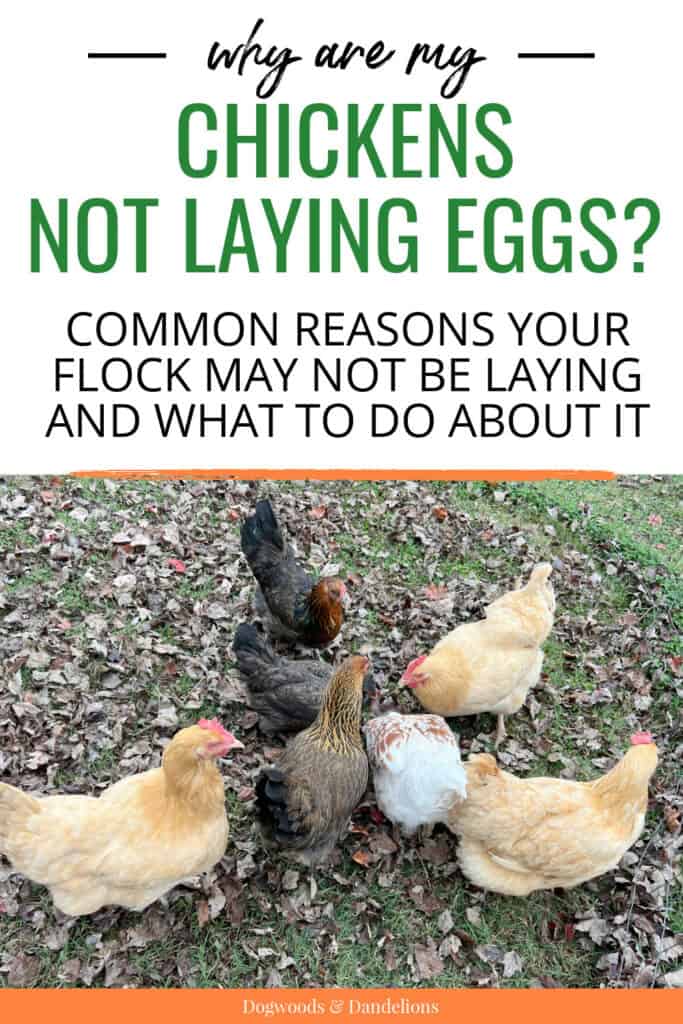Why Are My Chickens Not Laying Eggs
Inside: If your chickens aren’t laying eggs, you are probably wondering why. Explore the many reasons your chickens may not be laying eggs right now.
There can be many reasons why your chickens aren’t laying eggs. Let’s explore some of the most common reasons and what to do to get your hens laying again.
Affiliate Disclosure: Please note that some of the links in this article may be affiliate links and I may receive a small commission if you purchase something through a link. It will not change your cost. As an Amazon Associate, I earn from qualifying purchases. For more information, see my disclosures page.)
Why Are My Chickens Losing Feathers & Not Laying Eggs?
Molting can be one reason your chickens quit laying eggs. Molting requires lots of energy, so instead of producing eggs, the hens put that energy into growing shiny new feathers.
Not sure what molting means? When a chicken loses feathers and regrows new ones this is called molting. It usually happens once a year in late summer or early fall, though occasionally a hen will molt at another time.
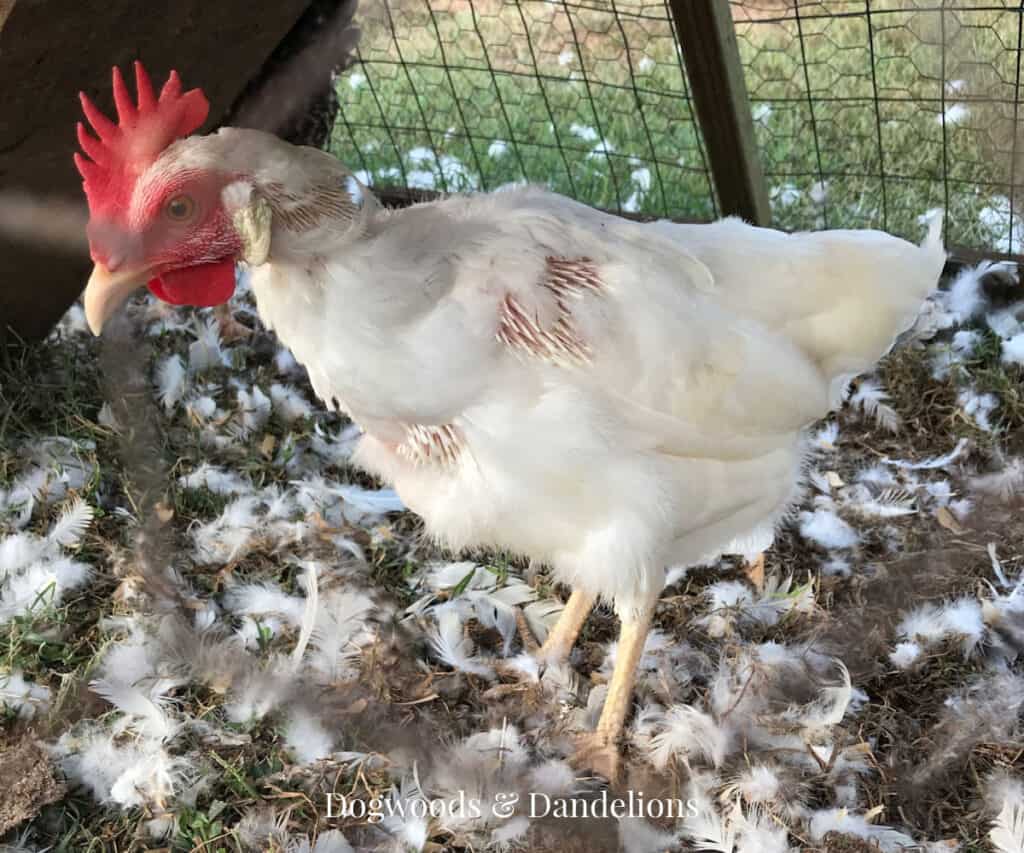
To help your flock recover quickly from their molt, feed them a slightly higher protein feed (18 percent versus the usual 16 percent) and cut back on treats and scratch. Adding the additional protein to the hen’s diet will help them regrow feathers quickly and get back to the business of laying eggs.
Read: How to Help Your Molting Chickens for more information.
Shorter Daylight Hours
The shorter hours of daylight in the winter can mean your chickens will not lay eggs as well or stop altogether. To understand why this happens, let’s look at how a chicken makes an egg.
The sun stimulates the pituitary gland of the chicken. This in turn stimulates the hen’s ovaries to release an egg. Hens need approximately 14 hours of light a day to produce an egg. So, as the days get shorter, the pituitary gland receives less sunlight so the hens naturally lay less.
To help combat the shorter days, you can supplement with artificial lighting. It is best to have the supplemental light come on early in the morning instead of late at night.
You will want to provide at least 14 hours of daylight so count back from sunset to see when you need your light to come on.
Chickens can’t see well in the dark, so if you use a light in the evening, when it turns off, your birds will have a difficult time finding their roost in the dark.
Please know that they won’t automatically start laying immediately upon adding some extra daylight to your coop. It may take several weeks for the hens to adjust and start producing eggs again.
And not everyone chooses to light their coop. The decision is a personal choice. To learn more about lighting a chicken coop read Should I Light My Chicken Coop?
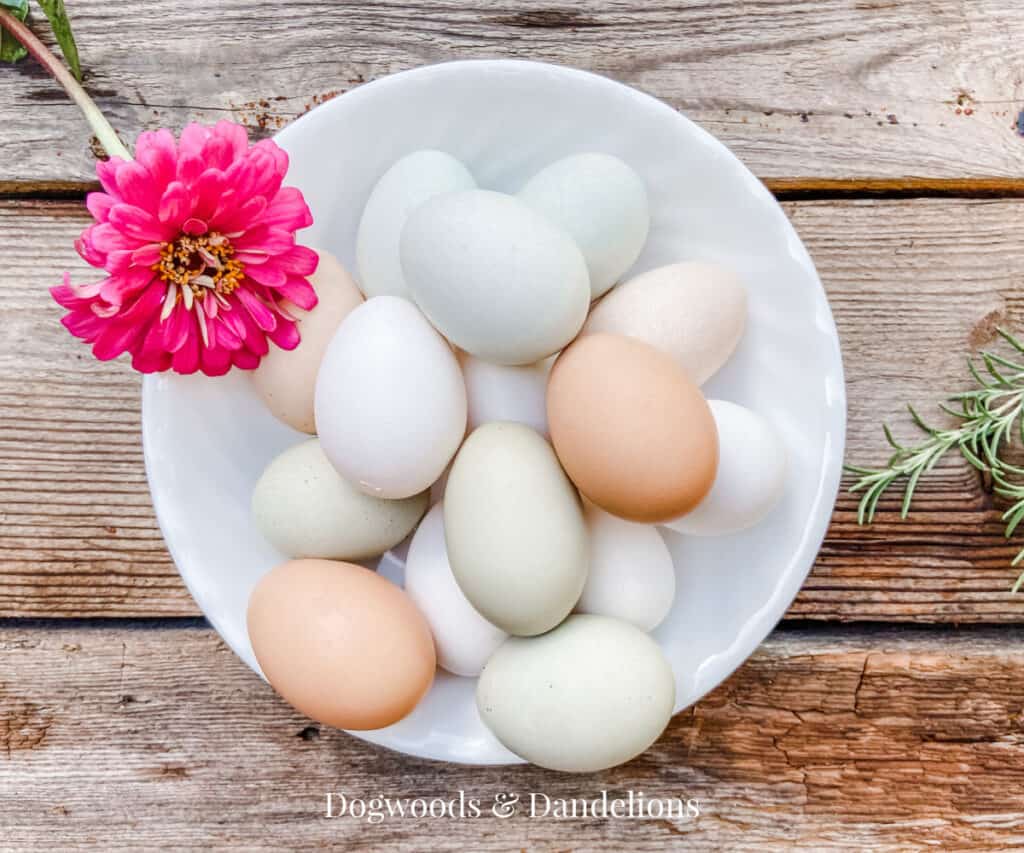
Parasites
If any of your hens have parasites, this can cause them to quit laying eggs. Internal parasites can cause nutritional deficiencies in your hens and this causes them to use their limited energy elsewhere.
And external parasites like mites also steal your hen’s energy so they may stop laying.
While the types of parasites chickens can have are too numerous to go into in this article, I did want to mention that it is a reason your hens may stop laying eggs.
Illness
Just like with parasites, any type of illness can slow or halt egg production in your flock. While it can be difficult to determine what is making your flock sick, it is the only way to know how to treat the problem and get your hens back to good health so they will lay again.
The Chicken Chick has some great articles on diagnosing illness in your flock.
Lack of Water
If your backyard chickens run out of water for even a few hours, it can slow or halt egg production, especially during the summer months.
Chickens need about one pint of water per day. On hotter days they may need more water and during the colder months, they may drink less. You should have clean fresh water available for your flock at all times.
Predators
Did your chickens stop laying eggs suddenly? If so, one common reason may be that something scared them. If you have predators threatening your hens, this can cause them to stop laying.
Anything that disrupts a chicken’s normal routine can cause your entire flock to stop or slow down egg production. And a predator attack definitely qualifies as upsetting their routine.

And if a predator ended up killing a flock mate, the chickens will likely grieve the loss of their chicken friend and stop laying for a few weeks.
Be sure your coop and chicken run are secure and lock your flock up in the coop every evening. Learn more about chicken predators and how to prevent them from attacking your flock in this post.
Sudden Changes in Their Lifestyle
Did you change your chicken’s feed? Move them to a new coop? Change their location? Add new flock members? Any type of sudden change can stress your chickens. And any time your chickens are stressed, they tend to stop laying eggs.
While many times you have no choice but to move your flock or add new hens to the existing population, anything that causes stress can cause your chickens to stop laying.
And when you add new members to the flock, it will naturally disrupt the pecking order. If you are joining two flocks or introducing new chickens to an existing flock, read How to Combine Two Flocks of Chickens.
This article shares my step-by-step method to integrate the chickens with the least amount of bloodshed. We’ve used this method many times to help minimize the stress when you need to move chickens into a new flock.
Even a change in layer feed, can cause your flock to temporarily stop laying. Similar to when people start a new diet and the new food messes with their gut, switching the brand or type of feed can disrupt your flock’s digestive process too.
If you are changing the kind of chicken feed (or even the brand of feed) you give your hens, it is best to do so gradually. Read How to Switch Chickens to a New Type of Feed to learn more.
Do You Have a Broody Hen?
If it is just one chicken that stopped laying suddenly, it could be because she is going broody. Is the hen sitting in the nest box all day? Coming out only to eat and drink and poop? She may be sitting on a clutch of eggs (or at least trying to).
If you don’t want to hatch chicks or you don’t have a rooster in your flock, it is best to break the broody hen as soon as possible. Sitting on eggs is not healthy for a hen, especially if she isn’t going to be allowed to hatch chicks.
If you need to break a broody hen, the Happy Chicken Coop wrote a great article on 6 Easy Ways to Break a Broody Hen.
Older Hens?
As hens get older their egg production decreases. They will tend to lay fewer and fewer eggs each year until they stop altogether.
If you have a flock of hens that is more than 3 to 4 years old, they will often take an extended break from laying during the winter.
The older hens will usually stop laying eggs when they molt (See above for more info on molting.) and not resume for several months. Many of our hens that are 5 years and older only lay about 6 months out of the year, from March to August.
Unfortunately, there isn’t a whole lot you can do to help older hens start laying. If you are concerned about your feed bill and don’t want to feed non-producing members of your flock, it may be time to consider culling the hens that have reached old age.
Do You Have an Egg-Eater in Your Flock?
Sometimes, you may not be getting your usual amount of eggs because you have an egg eater in your flock. Unfortunately, chickens do like their own eggs.
So if one gets broken in the nest box, this can start an egg-eating habit. You can read more about stopping chickens from eating eggs in this post.
Extreme Weather Can Affect Egg Laying
Extreme weather situations that vary drastically from the norm can cause a sudden lack of eggs in your egg basket.
Hot Weather
Hot weather can cause your flock to stop laying eggs. Contrary to popular belief, chickens actually prefer cooler weather over hot temperatures.
The best way to help your flock lay during a heat wave is to provide plenty of water and shade for your hens. Most of the time when the weather cools, they will start to lay again.
Read: How to Keep Your Chickens Cool in the Summer
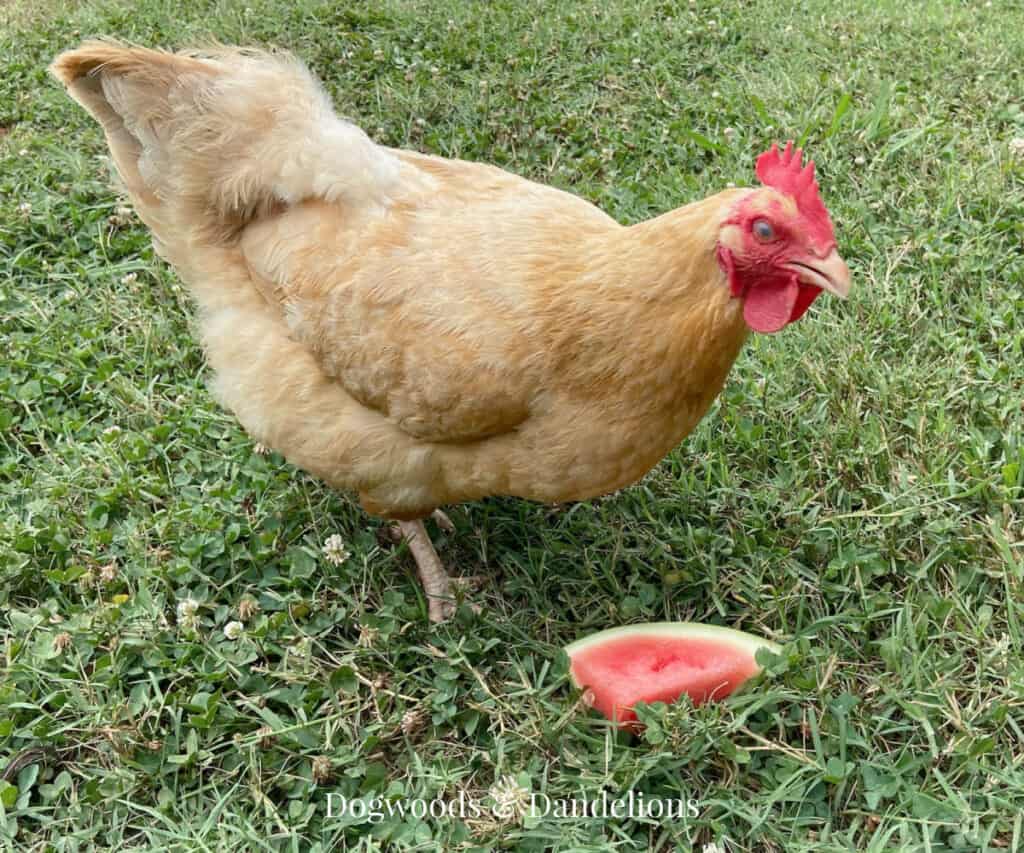
Cold Weather
While cold weather is not as likely to cause your hens to stop laying, sudden extreme cold can disrupt egg production for a few days.
Several of our hens had just started laying again after their molt in the fall when we experienced a drastic cold snap. It took about 2 weeks for the girls to start providing us with fresh eggs again.
Even in the coldest weather, I do not recommend you use a heat lamp. They are major fire hazards and every year I hear of families losing their entire flock to a fire.
And most chicken keepers don’t need to use supplemental heat anyway. Several chicken keepers in Maine never heat their coop and their flocks are just fine.
A draft-free coop with adequate ventilation is the best way to ensure your flock stays warm and cozy during the winter months.
If you feel you must heat your coop please use a radiant heater. While not 100 percent safe, radiant heaters are safer than heat lamps.
Too Many Table Scraps
Some people say feeding your flock too many table scraps and treats can cause your hens to decrease egg production, but this may or may not be true.
I know of people that quit giving their flock table scraps and almost instantly egg production picked back up. However, others say it has no bearing on the number of eggs.
If you find it difficult to free range your flock due to predators, feeding table scraps may actually help increase egg production, especially during the cold months when there isn’t much to forage for.
If none of the other options seem to be the reason your flock isn’t laying, it may be worth stopping table scraps and especially treats like scratch if you are feeding them lots.
On the other hand, if you aren’t feeding any scraps, you may want to try adding a bit to see if that improves the number of eggs your flock lays.
How to Have Eggs All Year
So while there are a lot of reasons you may notice a decrease in the number of eggs from your backyard flock, there are a few things you can do to help mitigate the loss.
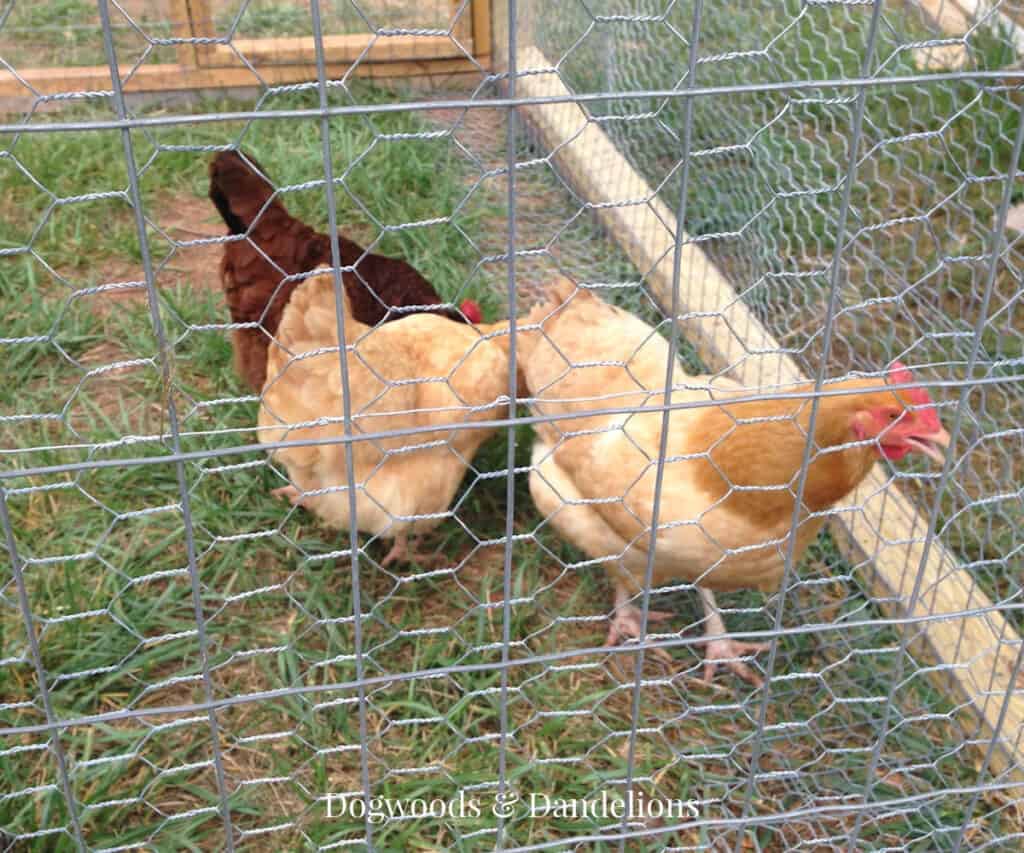
The best way to ensure you have fresh eggs most of the year is to get some new chicks each year. The baby chicks we get each spring will usually start laying in the fall and lay eggs right on through their first winter.
Be sure to have adequate nesting boxes for your hens that are comfortable, dark, and cozy. Provide plenty of food and clean water for your chickens.
Keep your chickens as safe as possible by providing a clean, well-ventilated coop and check often for any signs of illness and disease. Treat anything you find promptly.
And remember, eggs really are a seasonal product. If you want to be sure you have enough eggs for the winter months, you can learn how to freeze eggs from your backyard flock.
Related Posts
- Adding new chickens to your flock? These are some of the friendliest breeds of chickens.
- Do you need a rooster in your flock? Learn the pros and cons of owning a rooster.
- Got flies in the coop? These tips and tricks will help you keep the flies away.

Meet Julie
I’m a farm girl born and bred in North Carolina. I’ve been growing a vegetable garden for over 20 years (and helping my Mom grow hers even longer). I’ve been raising chickens in my bathtub and backyard for 12+ years. I believe that homegrown food can be made simple. Let’s get started.
